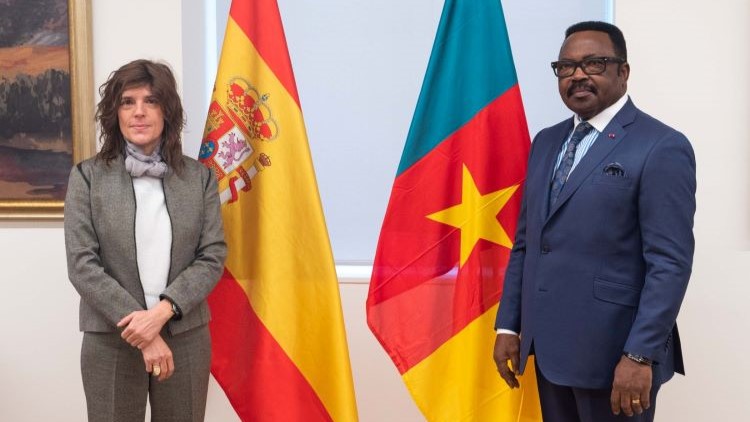The Diplomat
Spain and Cameroon have just held their first political consultations, almost 14 years after the two countries agreed to institutionalise them through a memorandum of understanding signed in Madrid in April 2009 by the then foreign ministers of the two countries, Miguel Ángel Moratinos and Henri Eyebe Ayissi.
After the signing of that agreement, there was no initiative to implement it, although in the last three years, there were some attempts that failed to materialise, first because of the Covid pandemic and then because of changes of government in Cameroon.
On Monday, finally, the State Secretary for Foreign and Global Affairs, Ángeles Moreno Bau, received in Madrid her counterpart, the minister delegate, Félix Mbayu, a very influential person in Cameroon’s power circles. On her Twitter account, Ángeles Moreno summed up the meeting thus. “We are working to strengthen our political, security and commercial relations and the dissemination of our language and culture”.
Mbayu also gave a lecture at the Diplomatic School, where he was introduced by the former Spanish ambassador to Yaoundé, Ramón Moreno; and yesterday he met with the State Secretary for Trade, Xiana Méndez, whose husband is, precisely, the diplomat Ignacio García Lumbreras, currently at the head of the Spanish Embassy in Cameroon.
Following the establishment of political consultations in 2009, Spain and Cameroon signed two other bilateral agreements: the agreement on cooperation in the fight against crime, in January 2011, and the agreement on air transport, in November 2012.
Spain’s cooperation with Cameroon in defense matters is framed in the Spanish involvement in the reinforcement of security in the Gulf of Guinea, both in the framework of the UN and the EU, as well as in the participation in some maneuvers of the Cameroonian Navy. Likewise, Spanish has become the first foreign language in Cameroon, after the two official languages, French and English. There are more than 400,000 students of Spanish in secondary education in the country and more than 3,000 in higher education. The Cultural Center of the Spanish Embassy works in this area to disseminate Spanish language and culture.
The business presence in Cameroon is scarce and the country is not among the geographic priorities of the Spanish Cooperation Master Plan, nor does it have a Technical Cooperation Office (TCO), although support has been provided to specific projects. It is also not included as a priority country in the Africa Plan of the Ministry of Foreign Affairs.







